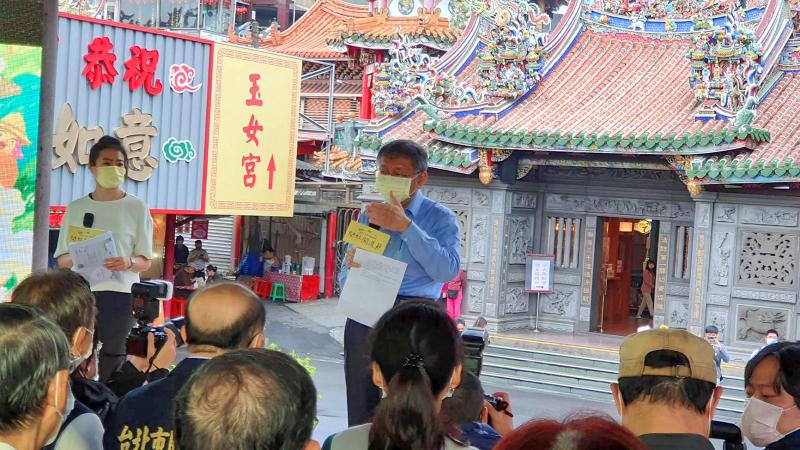Taipei is likely to set up a COVID-19 vaccination passport system that would result in people being seated in different areas in restaurants depending on vaccination status, Taipei Mayor Ko Wen-je (柯文哲) said yesterday.
Ko made the remark at a news conference to promote the Fun Guandu festival at Guandu Temple in the city’s Beitou District (北投).
During the event’s opening speech, Ko said he expects that more than 70 percent of Taipei residents would be fully vaccinated by the end of January and that Taiwan’s COVID-19 situation would ease fully before the Lunar New Year next year.

Photo: Yang Hsin-hui, Taipei Times
“Theoretically, people would not need to wear a mask after having received two doses,” he said, adding that with the expected progress in COVID-19 drug development, Taiwan could ease border restrictions in January.
“People who have not been vaccinated should go get their shots as soon as possible, because we will introduce a vaccination passport soon,” Ko said.
The passport would be integrated with the TaipeiPASS app, which would flash a “green light” for fully vaccinated people, “yellow” for those who had their first shot and “red” for unvaccinated people, he said.
Fully vaccinated people would be able to choose seats in restaurants freely, while unvaccinated people would be seated in separate areas with table dividers, Ko said.
More than 60 percent of Taipei residents have received at least one vaccine dose, he said.
As many people who are registered elsewhere live in the capital, it is possible that the actual first-dose coverage is about 70 percent, with 30 percent of people in Taipei being fully vaccinated, Ko said.
“As vaccine production has accelerated and Taipei can administer about 40,000 doses per day, I hope that the full-vaccination rate reaches about 70 percent by the end of the year,” he said.
Asked about Ko’s statement on mask wearing, Minister of Health and Welfare Chen Shih-chung (陳時中) said that the mask mandates would not be fully eased before the Lunar New Year.
Vaccinations would continue, said Chen, who heads the Central Epidemic Command Center (CECC).
Centers for Disease Control Deputy Director-General Chuang Jen-hsiang (莊人祥), who is a CECC spokesman, said that as long as there are COVID-19 outbreaks abroad, wearing a mask would be the “last line of defense” to prevent imported cases from spreading.

A magnitude 7.0 earthquake struck off Yilan at 11:05pm yesterday, the Central Weather Administration (CWA) said. The epicenter was located at sea, about 32.3km east of Yilan County Hall, at a depth of 72.8km, CWA data showed There were no immediate reports of damage. The intensity of the quake, which gauges the actual effect of a seismic event, measured 4 in Yilan County area on Taiwan’s seven-tier intensity scale, the data showed. It measured 4 in other parts of eastern, northern and central Taiwan as well as Tainan, and 3 in Kaohsiung and Pingtung County, and 2 in Lienchiang and Penghu counties and 1

FOREIGN INTERFERENCE: Beijing would likely intensify public opinion warfare in next year’s local elections to prevent Lai from getting re-elected, the ‘Yomiuri Shimbun’ said Internal documents from a Chinese artificial intelligence (AI) company indicated that China has been using the technology to intervene in foreign elections, including propaganda targeting Taiwan’s local elections next year and presidential elections in 2028, a Japanese newspaper reported yesterday. The Institute of National Security of Vanderbilt University obtained nearly 400 pages of documents from GoLaxy, a company with ties to the Chinese government, and found evidence that it had apparently deployed sophisticated, AI-driven propaganda campaigns in Hong Kong and Taiwan to shape public opinion, the Yomiuri Shimbun reported. GoLaxy provides insights, situation analysis and public opinion-shaping technology by conducting network surveillance

‘POLITICAL GAME’: DPP lawmakers said the motion would not meet the legislative threshold needed, and accused the KMT and the TPP of trivializing the Constitution The Legislative Yuan yesterday approved a motion to initiate impeachment proceedings against President William Lai (賴清德), saying he had undermined Taiwan’s constitutional order and democracy. The motion was approved 61-50 by lawmakers from the main opposition Chinese Nationalist Party (KMT) and the smaller Taiwan People’s Party (TPP), who together hold a legislative majority. Under the motion, a roll call vote for impeachment would be held on May 19 next year, after various hearings are held and Lai is given the chance to defend himself. The move came after Lai on Monday last week did not promulgate an amendment passed by the legislature that

AFTERMATH: The Taipei City Government said it received 39 minor incident reports including gas leaks, water leaks and outages, and a damaged traffic signal A magnitude 7.0 earthquake struck off Taiwan’s northeastern coast late on Saturday, producing only two major aftershocks as of yesterday noon, the Central Weather Administration (CWA) said. The limited aftershocks contrast with last year’s major earthquake in Hualien County, as Saturday’s earthquake occurred at a greater depth in a subduction zone. Saturday’s earthquake struck at 11:05pm, with its hypocenter about 32.3km east of Yilan County Hall, at a depth of 72.8km. Shaking was felt in 17 administrative regions north of Tainan and in eastern Taiwan, reaching intensity level 4 on Taiwan’s seven-tier seismic scale, the CWA said. In Hualien, the